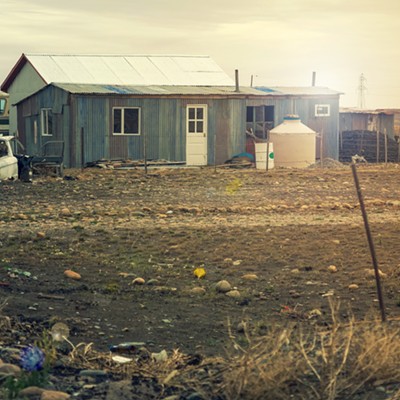Operating on principles derived from Enrico Fermi's team that was working with an atomic pile under the tennis courts at the University of Chicago, the scientists at Los Alamos, N.M., were so certain of their gun-type design that they didn't even think it was necessary to test it. (The bomb that was tested at Alamogordo, N.M., and the Fat Man device that was dropped on Nagasaki were both of the implosion variety, much more complex and with higher destructive yields.)
However, there was a problem with the gun-type design: The military engineers said it wouldn't work. In order to deliver the bullet down the barrel at a velocity that would lead to fission and not to meltdown, the engineers used a formula and determined that the cannon would have to weigh well more than 10,000 pounds, much too heavy for a plane to carry over a long distance.
The entire project sputtered to a halt as scientists, engineers and technicians tried to come up with a solution. Then, one day, somebody (legend has it that it was a lowly sergeant, but that's probably too cool to be true) realized that the formula that was being used was for the construction of a cannon that would be fired hundreds, if not thousands, of times. The cannon in this device would do its job and then be vaporized in a fraction of a second.
They redid the calculations, made the device out of lightweight metal, and in a relatively short period of time, built the Little Boy device that was dropped from the Enola Gay.
Chris Limberis loved that story when I told it to him. It was full of the follies and foibles that made investigative journalism his raison d'etre. Here you had some of the smartest people in the world--some of the smartest people of all time--and they couldn't see the forest for the trees. All brains and not a lick of common sense.
I thought of that story last week when I realized that it's been a year since Chris died. I was angry at myself for letting a year go by without doing something I had thought of at his memorial service. It's such a cliché, but the years really do fly by as we each careen toward our own individual oblivion.
Chris was recently inducted into the Arizona Newspapers Association (ANA) Hall of Fame. He would have despised being so honored, but he certainly deserved it. He was what journalism was and is supposed to be--a dogged seeker of truth, unafraid of where the search will take him, unfazed by praise, undeterred by criticism and absolutely relentless.
As I've mentioned, Chris and I played college basketball at the same time, he in Colorado, I in Arizona. When we were in college, it was a heady time for journalism. Two intrepid journalists had toppled a corrupt presidency, and J-schools were bursting at the seams with people who wanted to be the next Woodward and Bernstein.
There are still a lot of people who want to go into the media, but a lot of them (in my opinion) want in for the wrong reasons. They want to cover Britney Spears' white-trash love life or follow Brad Pitt around, hoping he'll do something that can be misconstrued as humanitarian. We've been dumbed down by junk news. People no longer have the attention span to read a newspaper article from start to finish, and the abomination of Fox "News" attacks the problem of slanted news coverage with even worse slanted coverage.
Still, there are bright spots. Some of the student newspapers in this area are very impressive. At Green Fields (where I coach), the student newspaper won the statewide ANA award for small schools three years in a row. The paper at Sunnyside High School is of very high quality, and the one at Salpointe Catholic High School is stunningly good, quite possibly one of the best such student papers in the country.
I am hereby announcing (a year late, and shame on me) the instituting of the annual Chris Limberis Memorial Scholarship. It will be awarded to a high school senior from Southern Arizona who wants to pursue a career in investigative journalism. The selection process will consist of an essay written about one or more of Chris' articles (which are all archived), a sampling of the students' clippings, a resume detailing academic and extracurricular excellence, and perhaps a brief interview.
The scholarship might not be a whole lot at first, maybe only a thousand bucks. I'll see if anybody wants to kick in with me, but if not, I'll just pay for it myself. Chris' memory is going to live on as long as I live, and, if there is any justice in this universe, long after that.










